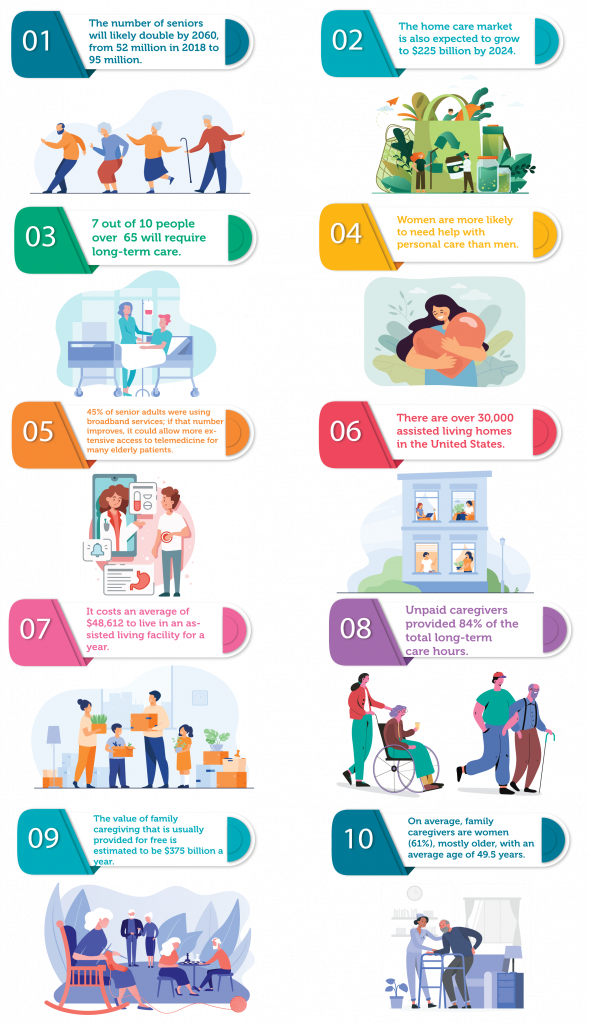
120+ Small Business Statistics that Every Business Owner Should Know
From growth trends to access to funding – equip yourself with insights to stay ahead of the curve and elevate your small business potential.

The world population is aging.
Data shows that the number of retirees will gradually surpass that of children for the first time in history. Even though the rate at which this is already happening worldwide differs from each country’s income, the demographic transition is still a global concern.
And as the aging population expands, so does the need for specialized programs for the elderly.
The demographic pyramid shift brings forth a change in priorities and raises a present-day concern for quality senior life. Elderly citizens should enjoy this sensitive phase of their lives with ease, comfort, and dignity. That can be made possible through senior care benefits that are easily accessible and available for all.
The good thing is that many companies now deliver different educational and supporting senior care resources and programs for employees and their family members. These services usually include anything from free assessments, counseling, and referrals to caregiving assistance, liability insurance, senior housing, and in-home care helplines.
As a growing need for the U.S. workforce, providing employees and their aging family members with these benefits can really make a positive difference in their lives.
Some recent senior care statistics further reveal how important it is to provide elder care benefits as part of an employee benefits package.

Unless tackled on time, the changing care demographics could have massive economic consequences.
Failing to provide senior care services to their employees can cause significant repercussions for companies. In the absence of a “care culture” in the workplace, people worry that taking on caregiving responsibilities can put them at a disadvantage in their career growth. And they’re right.
Namely, almost a third of all workers who voluntarily left their job cited caregiving responsibilities as their reason. The turnover rate and declining job productivity can create substantial hidden costs for companies.
Ultimately, there’s no denying that eldercare responsibilities are comprehensive and complex, especially regarding family caregiving. But whether institutional or in-home care, the people who built today’s society must be well taken care of in their later years.
That’s why delivering adequate support is essential. It can significantly increase the life quality of seniors, ease the burden of eldercare for employees, and reduce hidden costs for employers.
Browse our curated list of vendors to find the best solution for your needs.
Subscribe to our newsletter for the latest trends, expert tips, and workplace insights!

From growth trends to access to funding – equip yourself with insights to stay ahead of the curve and elevate your small business potential.

Unlock the power of expense management automation for a more secure financial outlook and discover how streamlining your expenses leads to improved financial wellness and stability.

Optimize your 401(k) strategies with key insights for companies and employees, ensuring a secure financial future for all stakeholders.

Understanding the pros and cons of using 401(k) as a first-time home buyer is crucial. Should using the 401(k) as a first-time home
buyer be considered as a last resort?
Shortlister Connect is a tool specifically designed to be utilized by the HR and Procurement/Sourcing teams within mid-size, large and jumbo employers. Shortlister Connect allows these teams to efficiently research & identify their optimal vendor partners, track existing vendor relationships & performance and “connect” with other employers to share successes and vendor experiences.
If you are not on the HR or Procurement/Sourcing team within an employer with over 200 employees, you will not be granted access to Connect. Examples of individuals that would not be granted access include, but are not limited to: vendors, students, practitioners, researchers, other non-employers or anyone that is unwilling to identify themselves will not pass our vetting criteria. If you are a consultant, Shortlister offers a specialized product for consultants, called Shortlister Select. You can email Tom Ciccotti at tciccotti@myshortlister.com to learn more about Shortlister Select.
***Shortlister retains the exclusive right to grant or deny access to any party to ensure the privacy of the vendors in our system.
Please login with your LinkedIn Credentials
Used by most of the top employee benefits consultants in the US, Shortlister is where you can find, research and select HR and benefits vendors for your clients.
Shortlister helps you reach your ideal prospects. Claim your free account to control your message and receive employer, consultant and health plan leads.